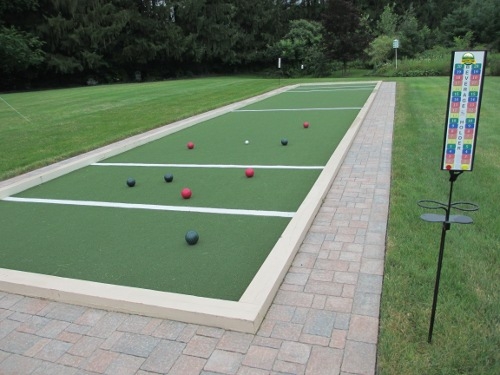It was a cool Saturday morning, with the sun hanging low in the sky. I arrived at Stevenson at around 7:58 A.M, wearing a zip up hoodie over a t-shirt. Walking over to the end of the field, I saw a small crowd of people standing near the fence. I joined them, and made sure to sign in so that there was evidence that I was volunteering at the Special Olympics bocce ball tournament. Barely 30 minutes had passed by and the morning was already starting to get hotter. I noticed some peers from my class were also there. I joined them, and the four of us became a team. After standing around and waiting in awkward silence, the coordinator spoke and t-shirts were passed out. I picked a shirt off the table and began heading towards the bathrooms to change. I swung open the door to the men’s bathroom, and in full view were a bunch of shirtless guys with the same idea. Lo and behold, the only stall in the entire bathroom was occupied. Some of the guys looked at me. I promptly turned back around and walked the other way. Everyone else was already wearing their volunteer shirts. After a few minutes had passed, I tried again-- upon entering the bathroom once more, there weren’t any shirtless guys crowding the small space but the stall was still occupied. I decided to stand by it and wait. More awkwardness ensued-- one of the people using the urinals was mooning everyone, there was a pungent smell in the air, and after the person in the stall was finally done, another person sprinted in with lightning speed, cut in front of me, and slammed the door shut. Not wanting to wait any longer, I decided to just leave the bathroom and figure something else out. In the end, I just decided to put the shirt over what I was already wearing. Soon thereafter, my team and I walked over to a spot in the middle of the field and began setting up our court.
(it looks sort of like this, but with longer grass and white rope).
After about 15 minutes, my group and I were able to set up the court and we went over the rules. Afterwards we were assigned our first athletes. We walked them to our court from the tents, and started the game. The game started with a coin toss-- whoever won got to go first. My team and I had to make sure that all of the rules were being followed, and we used a small red flag to indicate the position of the ball if it was hard to see for the athletes. At the end of each round we counted up the points, and sometimes we had to use a measuring tape if we were unsure as to whether one of the athletes’ balls counted in or not. After points were added up, we switched sides and started again. This process kept going until one of the players had 12 points, or if we ran out of time (30 minutes was the max). Surprisingly, not a single game that day went to 30 minutes. During the game, we cheered the athletes on and sometimes applauded whenever the athletes threw a really good toss. Another thing-- most of them were insanely good at bocce ball. So I must’ve said, “Nice!” and “That was a great toss!” and “Sweet!” about hundreds of times that day. One athlete that I remember well was Martha-- she had brought her boyfriend with her and his support was so sweet. She ended up in the finale I think. Something else that I remember distinctly-- every time we walked a new athlete(s) to our court, I would always strike up a conversation with them: “Nice to meet you guys! What are your names?” and “How long have you been playing bocce ball for?” and “Do you play any other sports?”
At around 10-11 AM, Subway sandwiches were passed out and we couldn’t just stop what we were doing, so we had to coordinate the games while trying to eat-- a feat that proved slightly difficult. Rounds ended after a couple of minutes, and we had to gather up the balls afterwards so I had to hold onto two to four 2-pound balls while still holding my sandwich and carry the balls across the court.
Later on in the day, we decided to alternate taking mini-breaks since we were getting pretty exhausted. On my break, I made the mistake of lying face-up on the grass, with the sun directly overhead, slowly scorching my skin, unbeknownst to me at the time. I had chosen to not wear any sunscreen that day. This was a mistake that I would regret several hours later. After my break, I joined back in and continued coordinating the games.
Sometime during the day, I remember dropping one of the bocce balls on my finger-- a rather painful experience. Though they are only 2 pounds, these balls are capable of quite some damage. The singles games turned into doubles, and now teams were competing against each other. Many times teams weren’t sure when they were supposed to go, so throughout the day we had to tell them (and the individual athletes) some of the rules regularly. Though I was happy to help them and explain some of the rules to them, it became a bit wearying saying the same things over and over again. By the time all the competitions were done and our court was packed up at around 2:40-3:30, I was glad that everything was done. The athletes’ months (and/or years) of practice had paid off terrifically, they received their awards, had a good time, and it was time to go home.
I came home at around 4:00, and one of the first things my mom said upon seeing me was how red my face was. I headed for the mirror and saw that my face had indeed become a glowing tomato. A bruise didn’t end up forming on my finger, but my face did sting for the next few days. Overall, this was a great experience that I don’t regret. Despite what doubts society may have about the abilities of people with disabilities, individuals like those in the Special Olympics help quash these types of misconceptions and stereotypes.






